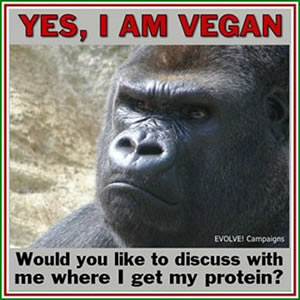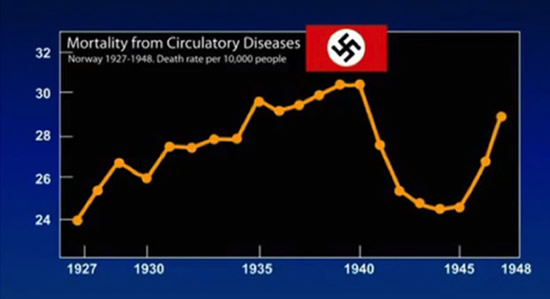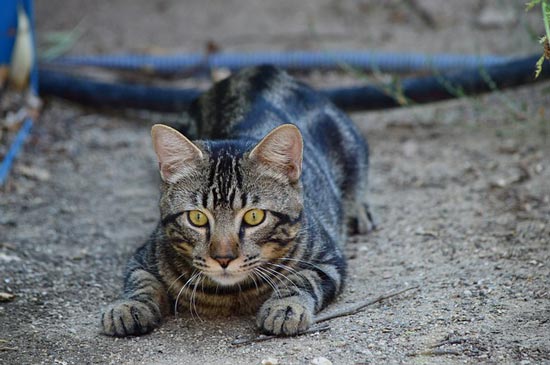
If your friends and family are anything like mine (in other words, meat eaters) then I’ll bet good money that the first question you had when you told them you were going vegan was “all well and good, but how are you going to get your protein?”
How indeed.
This got me to thinking deeper. Of course, I figured that I would replace the protein I had been getting from my vegetarian diet through eggs and milk with soy, pulses and seeds. Nuts are a good source too, but unfortunately I’m allergic to most of them.
Nevertheless, although I had planned on gorging on beans washed down with soy the question stuck in my head, and I began to think about how much protein I actually need, versus how much I have been taught to expect through my cultural upbringing and meat industry propaganda.
In the UK, we are recommended to eat 0.75g for every kilogram of weight- I weigh about eleven stone, which is seventy kilos, so that’s 52.5g of protein, per day. That’s really not much.
A 150g steak contains all the protein I would need for an entire day.
This doesn’t take in to account the other sources of protein I would eat during the day. Although it is generally considered amongst health practitioners that we can eat up to double our RNI of protein with no ill effects, by eating that steak I’m well on my way towards going beyond that figure.
“There is certainly no benefit to having very high protein intakes, and individuals who require high energy intakes for whatever reason should consider how to increase energy intake without increasing protein intakes excessively.” – Dr Helen Crawley, Nutritionist.
Hold on, now I’m really confused. So, we have an image in our minds that to be healthy we need a lot of protein in our diet.
Off the top of my head, my standard diet before I became a vegan was a couple of poached eggs on buttered toast for breakfast, coffee with whole milk, pasta with some Mediterranean vegetables for lunch and then perhaps an evening meal of homemade potato wedges with melted cheese, supplemented throughout the day by snacking on fruit.
Oh, and a giant pizza from Papa John’s once a week. Apart from the pizza, that’s pretty healthy, right? It’s all home-made.
By my own rough maths here as a vegetarian I was taking in an excess of one hundred grams of protein per day- barely under the top ceiling of double my RNI.
The amount of protein easily cracks that if I consider as a meat eater I would happily eat the same meals as listed above with added bacon and ground mince or chicken.
We see here that protein deficiency is not the issue.
So why do we persist in believing that high protein is automatically good?
Why would we have a booming trade in protein supplements?
The incomplete protein myth possibly persists in our societal common knowledge, but that still wouldn’t explain why we in the west are particularly obsessed with this one facet of our diets.
The Forks over Knives link about incomplete protein just spurred my mind onto something brought up in the Forks over Knives film.
In World War II, Norway was occupied by the Nazis. This was undoubtedly a bad thing for everyone, but inadvertently the occupation caused the near elimination of heart disease amongst Norwegians in six years.
How? The Nazis took over, and immediately began pilfering all the livestock. With no cows or pigs or chickens to eat, the Norwegians had to switch to a plant based diet.
As you see, as soon as the Nazis were kicked out, the mortality rate climbed back up.
Now, the only difference is the meat intake.
Obviously I’m not saying the Nazis were cool guys, they clearly sucked.

I must remind you that correlation does not equal causation – the reduction in heart disease may also be attributed to rationing (2000 calories per day) deaths caused by violent means (which would obviously preclude people from dying from heart disease) or the greater proportion of fish consumed by the population in place of meat.
The people of Norway also experimented with eating moss and seagull, but without corroborative studies as to the effect of eating seagull on heart disease I am unwilling to draw a conclusion on that.
In summary, although we cannot categorically state that the reduction in farmed meat eaten solely led to a reduction in heart disease, it was at least a contributing factor if not the primary cause.
So, we have a clear case study of a positive health benefit from a reduction in protein, and another more recent study linking the daily consumption of processed meat to a 44% increase in the likely hood of early death.
The naked truth is that we human beings are not intended to gorge on meat products. This makes perfect sense when you consider that the easy acquisition of animal products has been a factor in our lives for only a century- and never to such a great extent as it has been in the post-war era.
This is a tiny fraction of our history stretching back over 160,000 years. Human beings are simply not able to process high protein diets- at all.
To provide ourselves with a protein-rich diet that slowly kills us, we slaughter three thousand animals per second.
So why do we do it?
Again, the answer is in our biological make up. There is a reason why we humans are capable of eating meat. As part of our development it was a great survival perk to be able to consume a wide variety of food sources.
The high levels of protein fuelled us, aided nursing mothers in the production of fatty milk which was the catalyst for the development of our brains which in turn led to the abandonment of the hunter/gatherer lifestyle and began civilisation as we know it.
We are biologically primed to associate meat, a historically high risk, high reward food, with pleasure. When the option for eating dinner was either a handful of berries or catching a deer, our ancestors quickly developed the taste for meat.
We don’t need to do this anymore. We, in theory, are more civilised if not smarter than our cave dwelling ancestors.
Our skill in farming vegetables has grown to such a level that if we chose to we could feed the entire planet’s population several times over, if only we would stop grazing cattle.
We’ve already seen that the amount of protein we require is only 0.75g per kilo of body weight. So why do we need protein at all?
I'll not go into too much detail as it is pretty dry. Suffice to say there are nine essential amino acids we must get from our food which are composite parts of protein. All protein is, is a macromolecule comprised of amino acids chains.
We are told again and again that it is only from meat that we can get all nine, and stay healthy.
The truth is that the animals we eat are similarly unable to synthesise these nine amino acids, so the animals get them from plants.
When we eat meat to get protein, all we are doing is choosing to consume the component parts we require (amino acids) in a more condensed form- the animal that we slaughter.
What is true is that not every plant protein contains large amounts of all nine of these amino acids, and is hence labelled as “incomplete” by pro-meat dieticians and anyone who would argue that vegans are unhealthy.
What is false is the claim that plants are somehow missing these nine amino acids.[1]
This is fundamentally untrue and is the great key to the whole protein misinformation myth. A well rounded plant based diet involving pulses, seeds, vegetables, grains and legumes will satisfy the protein requirements of everyone- from the sedentary to the hardcore athlete.
With the facts quite clear that short of famine conditions or genetic defect protein deficiency is incredibly rare, what about excess consumption of protein?
A 1985 study in the Journal of Applied Physiology set trained strength athletes and sedentary volunteers on randomly assigned diets. Low protein (0.86g/Kilo), moderate protein (1.40g/Kilo) and high protein (2.40g/Kilo).
The findings were significant. The low protein diet was perfectly adequate for a sedentary lifestyle, and this sample group found no benefit in a moderate or high protein diet, and in fact found that these diets resulted in a nutrient overload.
In other words, the human body is unable to process high levels of protein without high levels of activity to necessitate the consumption. So, what happened to the weightlifters?
The study shows that a low protein diet was insufficient for the body’s requirements when training. A low protein diet showed a decrease in whole body protein synthesis, the means through which we extract amino acids from food.
The moderate diet was beneficial; showing an increase in protein synthesis, but the high protein diet provided no further increase but, like the sedentary sample, showed signs of nutrient overload.
A following study in 2006 corroborated the findings when applied to endurance athletes, stating that a protein intake of 1.2g per kilo was required to maintain a positive nitrogen balance.
Apologies for the science talk; I am endeavouring to explain in clear terms the requirements our body needs.
What we can take from these studies is simple: There is no need to gorge on protein, at all. As vegans, we are in no danger of protein deficiency provided we are actually eating a balanced diet.
The crazy thing is we have a highly advanced sensor for when we are feeling deficient or saturated in anything. When we feel hungry, thirsty, sleepy, these are signs our body requires something, be it sustenance or rest.
The problem has been an aspect of nurture, not nature- although the word nurture couldn’t be further from the truth. My mind and body has been subjected to counter-productive propaganda from business interests and well meaning advice from family and friends who have similarly been hoodwinked.
When scientific evidence is consulted, the protein deficiency myth is not just a scary story, but is revealed to be a calculated fabrication to perpetuate an industry that depends on our complicit acceptance of a lie- that meat is necessary for the human body to thrive.
Whether you are an athlete or not, you do not need meat. Taking my own body as an example I exercise only a couple of times a week, but that’s hopefully going to increase. I’m trying to get healthy, but I’m a fairly lazy and ill disciplined type.
A moderate protein diet of 1.4g per kilo (still well within the UK’s recommended maximum) will provide me more than all the protein I need. That works out to 98g of protein per day.
Where do I get this protein from? Here are a few sample ingredients I usually get through on a daily basis.
- 2 x Banana – 3g
- Kidney beans (200g) -50g
- Porridge oats (200g) – 22g
- Soy milk (250g) – 8g
- Quinoa (1 cup) – 8g
- Large flat mushroom – 2g
- 2 x medium potatoes (boiled) -9g
I’ve just listed these off the top of my head after eating them today. I’ve not gorged myself by any stretch, and that’s easily smashed 100g of protein, and that’s not including the other vegetables I ate, onions, half a red pepper, half a courgette. A pear and some grapes. There’s more I’m sure I’ve forgotten.
If we disassociate the contentious issue of meat consumption from the actual science, we see that meat is totally unnecessary for the human diet when it comes to protein; the argument posed to vegans that we are somehow lacking in essential amino acids is a straw man based on lack of knowledge.
Which brings me to the major problem I have found in researching this topic for you. There is a vast amount of misinformation out there, from both sides of the discussion that obfuscates the issue in a massive way.
It is up to us to take responsibility for our dietary needs, ignore the programming that tells us lies about meat being vital, and keep munching on the good greens while educating ourselves. The Earth provides us with everything we will ever need.
[1] Nutrition Almanac, 4th edition.

![Vegan Vs. Vegetarian – What's the Difference [And is There Beef?] vegan vs vegetarian](https://www.theplantway.com/wp-content/uploads/2015/01/vegan-vs-vegetarian.jpg)


The China Study is a really great read when it comes to protein, especially animal vs plant protein. One of the most challenging terms used in science is that of “quality”. Because animal protein is more “complete” than plant protein, the word “quality” is used, despite the many negatives of consuming it. Unfortunately in society, the word “quality” is used to tell us how healthy and great meat is for us, which couldn’t be more wrong.
Feb 09, 2015 at 7:51 pm
That’s a very important point. The language and general narrative used by the meat industry to steer the public’s perception and opinion of meat vs plants and meat-eater vs vegan is the cause of so many myths.
Feb 10, 2015 at 8:09 am
It’s so hard to keep track of what’s considered healthy and what’s considered terrible these days…seems like every time I turn around someone has a new amazing discovery. How do you find legitimate stats??
Feb 07, 2015 at 3:06 pm
nutritionally speaking this website: http://nutritiondata.self.com/ is pretty good. Breaks down the nutrient content quite well. As to the statistics on how much of each nutrient is required, it’s a case of either finding scientific studies, or finding websites you can put your trust in to interpret the data for you in an unbiased fashion- we do try to do that despite being a clearly pro-vegan site 🙂
Feb 07, 2015 at 7:44 pm